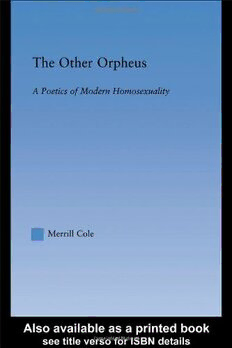
The Other Orpheus: A Poetics of Modern Homosexuality (Literary Criticism and Cultural Theory) PDF
198 Pages·2003·1.005 MB·English
Most books are stored in the elastic cloud where traffic is expensive. For this reason, we have a limit on daily download.
Preview The Other Orpheus: A Poetics of Modern Homosexuality (Literary Criticism and Cultural Theory)
Description:
Since the troubadours, Western poetry has rarely spoken of love, desire and pleasure without invoking the spectre of death. Western discourse also marries representations of homoeroticism to catastrophe; an entire modern narrative sub genre, for instance, plots the untimely demise of a wayward homosexual protagonist, a narrative sometimes resuscitated in media discourse on AIDS. Merrill Cole argues that death, whether through complications resulting from a compromised immune system, or as the result of gaybashing, provides narrative satisfaction. This narrative not only informs the critical reception of Arthur Rimbaud and Hart Crane, but also the structure of T. S. Eliot's anti-narrative poem, The Waste Land . This book posits that male homoeroticism is a crucial component of any comprehensive understanding of modernism and the crisis of modern masculine identity. Cole explores how homoerotic affect - instantiated in the works of Rimbaud, Crane and Eliot - contributes to queer theory, and shows what poetry has to offer critical inquiry. This book aims to re-establish an interest in poetry by integrating question of prosody and aesthetics with political literary study. Cole used the methodological insights of psychoanalysis, deconstruction and Marxism to elaborate the social significance of poetic experiment, and reinvigorate the concepts of affect and imagination, while arguing against antiformalist approaches to literature.
See more
The list of books you might like
Most books are stored in the elastic cloud where traffic is expensive. For this reason, we have a limit on daily download.
